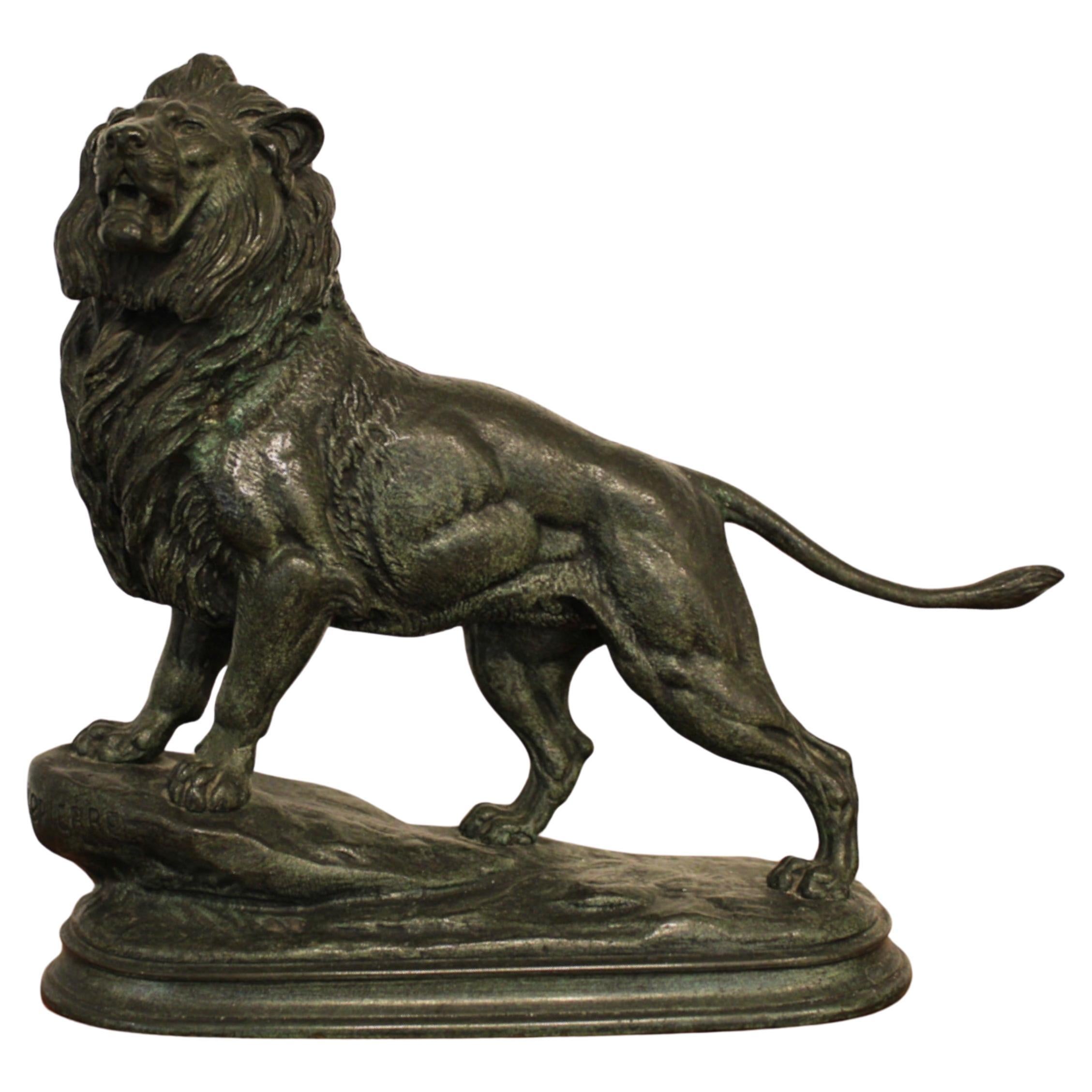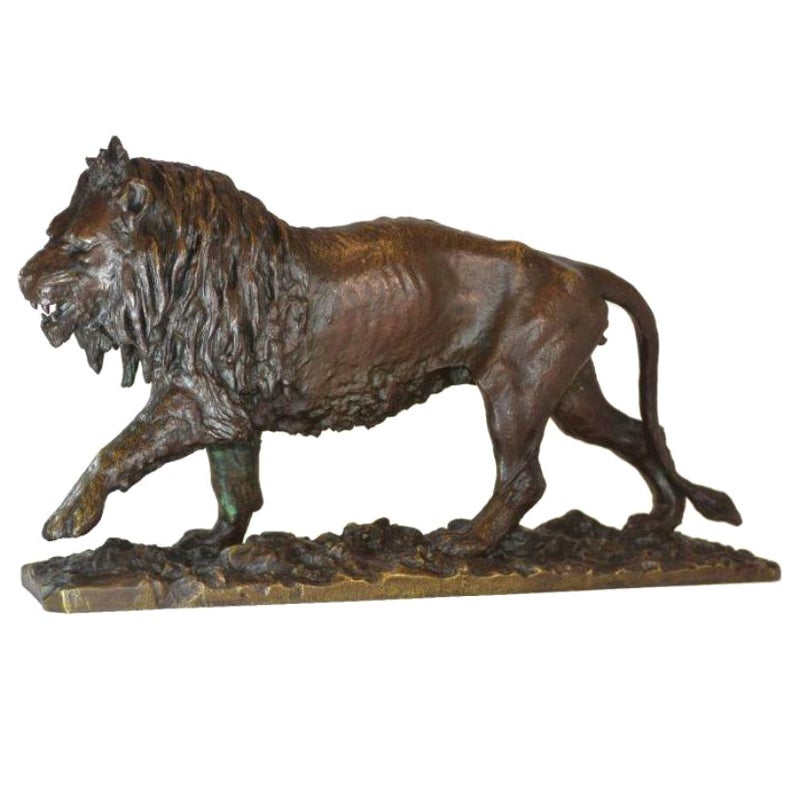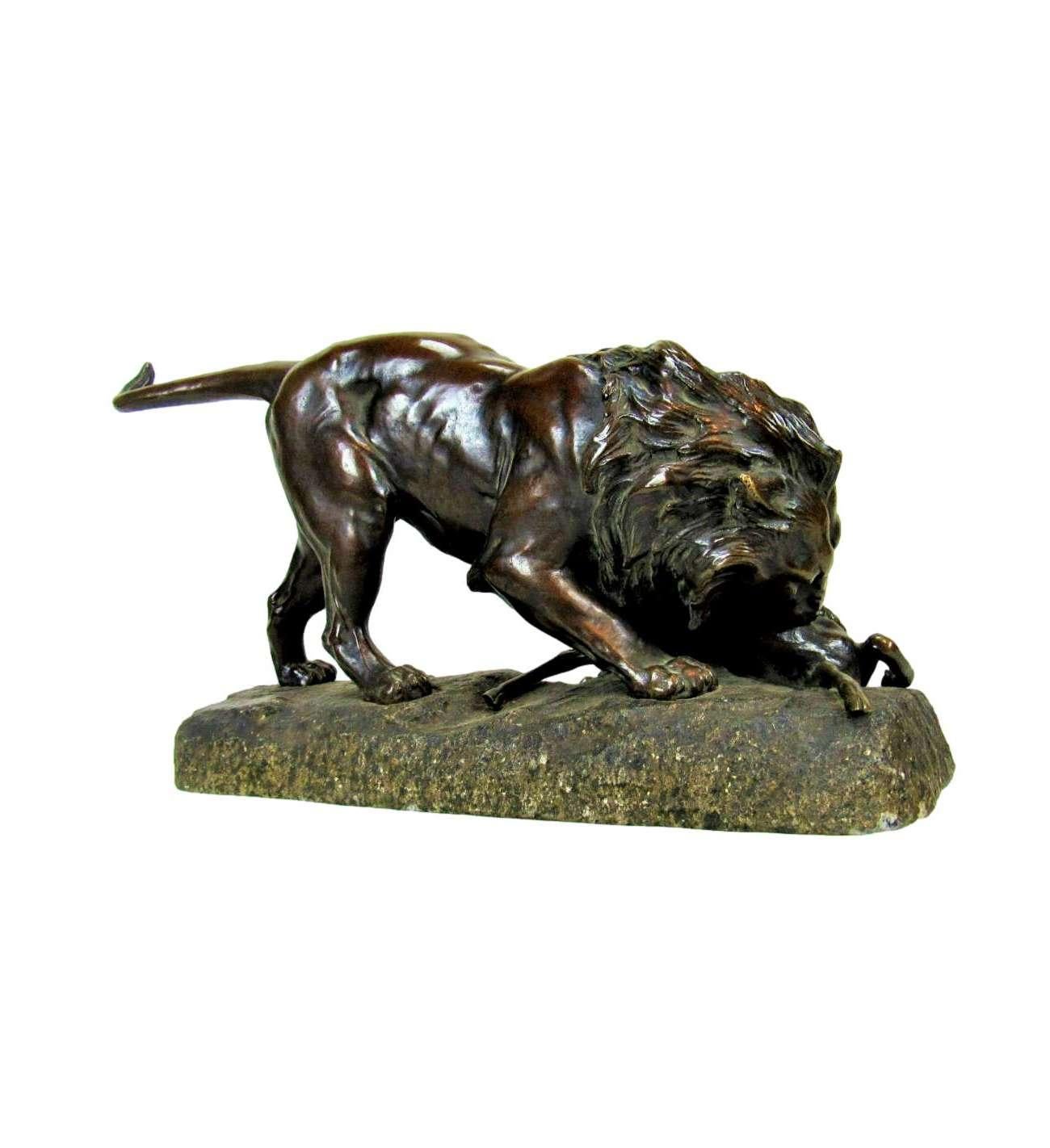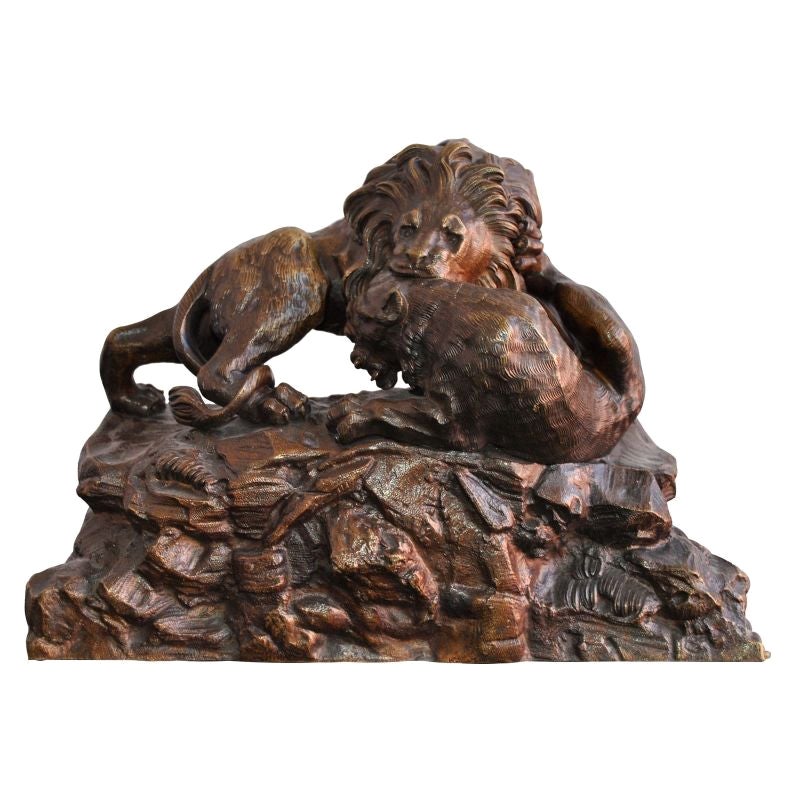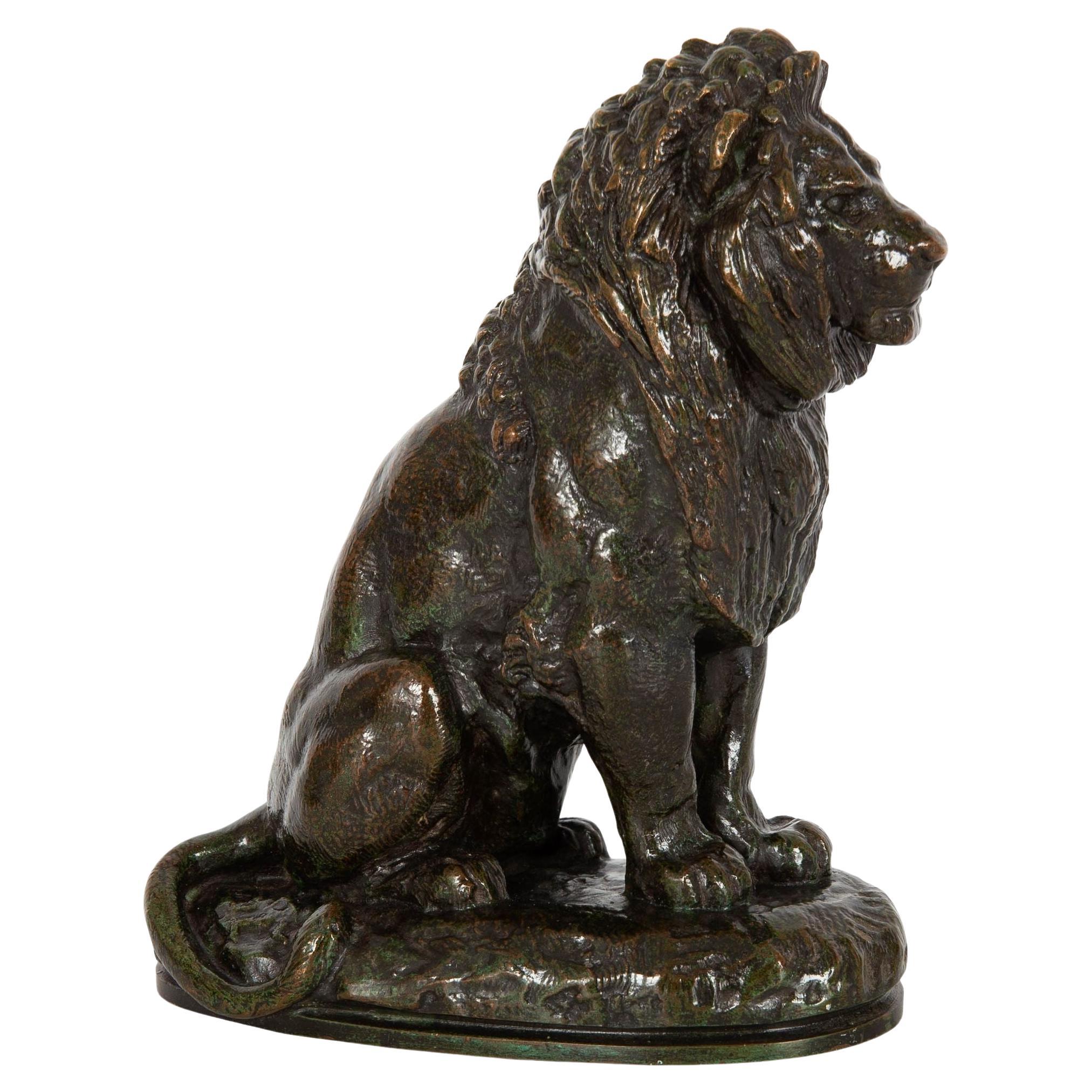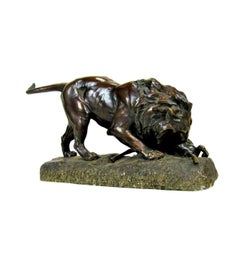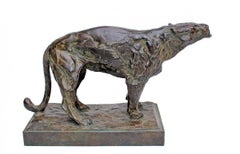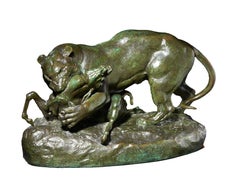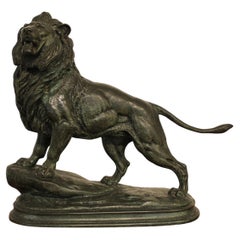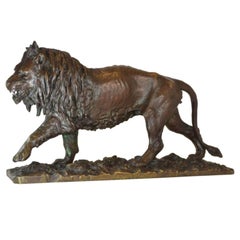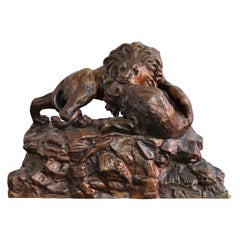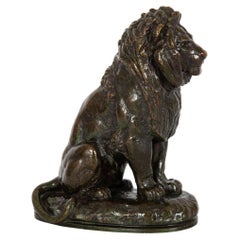Items Similar to Josuë DUPON (1864-1935) Lying Lion Bronze (ca 1908)
Want more images or videos?
Request additional images or videos from the seller
1 of 8
Josuë DuponJosuë DUPON (1864-1935) Lying Lion Bronze (ca 1908)
$9,106.25
£6,973.24
€7,750
CA$12,798.85
A$14,039.64
CHF 7,345.76
MX$167,099.71
NOK 92,781.42
SEK 87,030.63
DKK 59,038.96
About the Item
Lying Lion (Ca 1900)
A fine bronze sculpture of a lion lying on a rock. This statue by Josuë Dupon (1864 -1935) has a brown reddish patina with green highlights. Signed Josuë Dupon on the terrace.
Title: Lying Lion
Measurements: 20 cm (h) x 46 cm (l) x 25 cm (w)
Material: Bronze cast
Signed: Josuë Dupon
Foundry stamp: None
Josuë Dupon (1864 -1935)
Josuë Dupon (also Josué or Josue Dupon) was a Flemish sculptor and engraver. His work also includes painting and graphics.
He received his training through evening classes at the academy of Roeselare and Antwerp (1884) and later at the National Institute of Fine Arts (1887). In 1891, he won a gold medal with the monumental sculpture group Samson kills the lion and was runner-up in the Prix de Rome for sculpture. From that year on, his work appeared regularly in exhibitions at home and abroad. His reputation was such, that he became one of a select group of sculptors allowed by King Leopold II to carve statues in Ivory, which was imported from the Congo, the Belgian colony. In 1893 his exceptionally refined ivory statue of Diana was bought by the Antwerp Royal Museum of Fine Arts, which also acquired his spectacular bronze Vulture defending its prey a year later.
Working in every genre and mastering every technique and material, Josuë Dupon became best known as a sculptor of exotic animals. He was equally capable of faithfully expressing anatomical detail as of rendering the animals' nature. Josuë Dupon was a technically faultless realist, with a sense of the dramatic, a feeling for decorative complexity and a tendency towards idealizing. The placement of his camel driver and two bronze groups at the entrance to Antwerp Zoo confirmed this reputation as animalier.
The career that Dupon subsequently built, brought him numerous important awards and an appointment as professor at the Antwerp Academy, a tenure he held between 1905 and 1934. Besides animals, he sculpted busts, war memorials and public monuments. For one of the largest sculptural monuments and the largest fountain in the city of Buenos Aires, called Monument of the Two Congresses, he collaborated with his good friend, the Belgian sculptor Jules Lagae. Josuë Dupon created several statues of mighty condors for this monument.
At the start of his career his conception of art was strongly influenced by traditional 19th century artistic ideals. After the turn of the century his compositions and surface treatment changed and became more modern. He met Rembrandt Bugatti around 1905 or 1906 in the 'Jardin des Plantes' in Paris and invited him to Antwerp. Bugatti began travelling to Antwerp in 1906 to observe and sculpt the inhabitants of its zoo, which was then considered the best in the world, and Dupon allowed Bugatti to stay with him during several of his early visits. As such Dupon became a friend and a bit of a father figure to Rembrandt Bugatti.
Dupon did not play a very active part in artistic movements or associations. Dupon remains an important sculptor not only through his body of work but also because of the influence he exercised through interactions and collaboration with other sculptors such as Lagae, Bugatti and Bourdelle but also because he trained leading sculptors such as Albéric Collin (1886-1962), Willy Kreitz (1903-1982) and Albert Poels (1903-1984).
- Creator:Josuë Dupon
- Dimensions:Height: 7.88 in (20 cm)Width: 18.12 in (46 cm)
- Medium:
- Period:
- Condition:
- Gallery Location:Gent, BE
- Reference Number:1stDibs: LU2140213847572
About the Seller
5.0
Vetted Professional Seller
Every seller passes strict standards for authenticity and reliability
Established in 2018
1stDibs seller since 2022
6 sales on 1stDibs
Typical response time: 6 hours
- ShippingRetrieving quote...Shipping from: Gent, Belgium
- Return Policy
More From This Seller
View AllGeorges Gardet — (1863-1939)+ Bronze cast, Lion Devouring an Antelope
By Georges Gardet
Located in Gent, VOV
Lion Devouring an Antelope
A fine bronze cast of a lion, representing the carnivore who has just killed an antelope, by Georges Gardet (1863-1939). An old cast with a dark brown sha...
Category
Late 19th Century Realist Figurative Sculptures
Materials
Bronze
Roaring Lionness
Located in Gent, VOV
A fine quality, twentieth-century bronze model of a roaring lioness by Alberic Collin (Belgian 1886-1962). Prior to casting by the Valsuani foundry it w...
Category
1930s Art Deco Figurative Sculptures
Materials
Bronze
Antoine - Louis BARYE (1795-1875)Tiger surprising an antelope Bronze
By Antoine-Louis Barye
Located in Gent, VOV
Tiger surprising an antelope (terrace without profile)
Bronze with a shaded green patina, circa 1880
Signed 'BARYE', stamped 'H' by the founder Brame
Antoine-Louis Barye (1796-187...
Category
19th Century Figurative Sculptures
Materials
Bronze
Lioness standing on a sphinx - Clovis-Edmond Masson (1838-1913)
Located in Gent, VOV
A fine quality, nineteenth-century, bronze model of a ‘lioness and a sphinx’ by Clovis Edmond Masson (1838-1913). It is signed on the sphinx and has a red-brown patina with 'sandy hi...
Category
Late 19th Century Realist Figurative Sculptures
Materials
Bronze
Guido Righetti Bronze Sacred Hamadryas Baboon (Model c. 1917)
Located in Gent, VOV
This rare and striking sculpture by Guido Righetti, titled Sacred Hamadryas Baboon, is a compelling study of the sacred primate rendered in a modern, expressive idiom. Modeled in 191...
Category
20th Century Modern Figurative Sculptures
Materials
Bronze
Guido Righetti - (1875-1958), Bronze+ Fighting Tigers n°1
Located in Gent, VOV
Fighting Tigers No1
This statue by Guido Rigehtti (1875-1958) represents two tigers in a violent combat. It was originally created in 1919. In total Righetti created three different...
Category
Early 20th Century Modern Figurative Sculptures
Materials
Bronze
You May Also Like
Lion bronze sculpture by Edouard Delabrièrre, France, 19th Century
By Paul Edouard Delabriere
Located in Paris, FR
Lion bronze by Edouard Delabrière (1829-1912)
Signed E. DELABRIERRE
France, 19th century.
Category
Antique 19th Century French Animal Sculptures
Materials
Bronze
19th Century Lion Animal Bronze by Fratin
By Christophe Fratin
Located in Marseille, FR
Lion animal bronze patina 19th century medallion signed Fratin on the terrace dimension 53 cm long 31 cm high 15 cm deep
Additional information:
Materi...
Category
Antique 19th Century Animal Sculptures
Materials
Bronze
Unsigned 19th Century Animal Bronze with Lions
Located in Marseille, FR
Unsigned 19th century animal bronze with medal patina lions. No foundry mark. Dimension height 21 cm width 31 cm depth 11 cm.
Additional information:
Material: Bronze.
Category
Antique 19th Century Animal Sculptures
Materials
Bronze
Bronze Sculpture “Lion Assis No. 2”, Antoine Louis Barye, circa 1880
By Antoine-Louis Barye
Located in Shippensburg, PA
Initially modeled by Barye in 1846 as a commission by Louis-Phillipe for the Tuilleries Gardens at a cost of 10,000 francs, the life-size sculpture sat near to Barye's Lion au Serpent until it was later moved in 1867 to the grand entrance to Pavilion de Flore and a pair was crafted for it using a mechanical technique. This incensed Barye, as he insisted a mate must be sculpted to oppose Lion Assis...
Category
Antique 19th Century French Romantic Animal Sculptures
Materials
Bronze
Bronze Statue, Roaring Lion, 19th Century
Located in Beaune, FR
Bronze with brown patina representing a roaring lion. 19th century sculpture in good condition.
Category
Antique 19th Century French Animal Sculptures
Materials
Bronze
Majestic Copper And Composite Lion Sculpture - A Statement of Power and Artistry
Located in Delray Beach, FL
Capture the untamed spirit of the wild with this copper and composite lion sculpture, a true testament to the power and grace of the king of beasts. This exquisite piece is more th...
Category
20th Century American Animal Sculptures
Materials
Composition, Copper
More Ways To Browse
Antique Bronze Sculpture Signed Art Sculptures
Antique Lion Sculpture
Sculptures Of Lions
Bronze Lion Sculpture
Lion Sculpture Bronze Gold
Antique Exercise
Antique Willys
Rembrandt Bugatti
Alberic Collin
Jules Lagae
Willy Kreitz
De Sanctis
Dylan Water Bag
Jesmonite Sculpture
Joseph Mugnaini
Juan Quezada
Macdonald Dancer
Metamorphosis Sculpture
